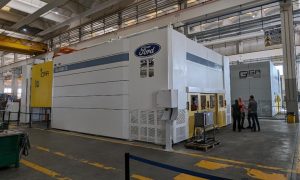Louisville, KY — In a surprising turn of events, approximately 8,700 members of the United Auto Workers (UAW) at Ford Motor Company’s Kentucky Truck Plant staged a walkout on Wednesday evening. This strike, led by UAW President Shawn Fain and Vice President Chuck Browning, emerged in response to Ford’s refusal to make further concessions during the ongoing negotiations with the Big Three automakers: Ford, General Motors (GM), and Stellantis.


Negotiations Stagnate
Fain emphasized the urgency of the situation, stating, “We have been crystal clear, and we have waited long enough, but Ford has not gotten the message. It’s time for a fair contract at Ford and the rest of the Big Three. If they can’t understand that after four weeks, the 8,700 workers shutting down this extremely profitable plant will help them understand it.”
Ford’s Counter Statement
In a swift retort, Ford denounced the UAW’s tactics, branding the walkout as “grossly irresponsible.” The automaker alleged that the UAW leadership’s intention was to inflict “reputational damage” and sow “industrial chaos” to weaken the Detroit 3.
Ford further clarified that it had extended an outstanding offer to the UAW, an offer publicly hailed by the union as the most favorable on the table. The automaker also underscored its unique position as the only company to increase UAW jobs post the Great Recession.
Ford’s Perspective
- Outstanding Offer: “Ford made an outstanding offer that would make a meaningful positive difference in the quality of life for our 57,000 UAW-represented workers, who are already among the best compensated hourly manufacturing workers anywhere in the world.”
- Bargaining in Good Faith: “In addition to our offer on pay and benefits, Ford has been bargaining in good faith this week on joint venture battery plants, which are slated to begin production in the coming years.”
Plant’s Significance
The repercussions of this strike extend far beyond the plant gates. The Kentucky Truck Plant stands as Ford’s largest facility and ranks among the world’s largest auto factories, boasting an annual revenue of $25 billion and employing over 9,000 workers directly. This powerhouse of production churns out the F-Series Super Duty, the Ford Expedition, and the Lincoln Navigator.
Conclusion
As the Ford Kentucky Truck Plant Strike continues, both sides remain entrenched in their positions. The economic ramifications of this standoff are substantial, affecting not only the workforce but also suppliers, dealers, and commercial customers. The outcome of these negotiations will undoubtedly shape the landscape of labor relations in the automotive industry for years to come.
ALSO READ :-
Tesla Reveals Exciting New Color Options for Model 3 and Model Y with Premium Wraps
Tesla V4 Supercharger Release Date, Price, Performance, Specs, Benefits And More
Tesla V4 Supercharger Takes EVs to the Next Level
Tesla Model 3 Highland Release Date, Price, Performance , Interior, Specs and More
SOURCE : TESLARATI
FAQs
What led to the strike at Ford’s Kentucky Truck Plant?
The strike was called by UAW President Shawn Fain and Vice President Chuck Browning after Ford declined to make further concessions during ongoing negotiations.
How has Ford responded to the strike?
Ford criticized the UAW leadership’s tactics, labeling the walkout as “grossly irresponsible.” The automaker emphasized that it had presented an outstanding offer, one that was publicly acknowledged by the UAW as the most favorable.
What is the significance of the Kentucky Truck Plant?
The Kentucky Truck Plant is Ford’s largest facility and one of the world’s largest auto factories. It generates $25 billion in annual revenue and employs over 9,000 workers directly. The plant produces the F-Series Super Duty, the Ford Expedition, and the Lincoln Navigator.
